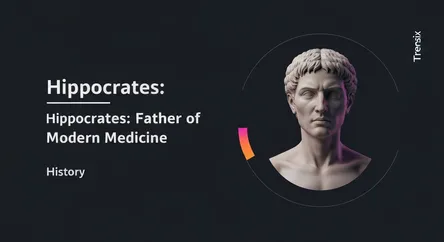History
Hippocrates: Father of Modern Medicine

Discover Hippocrates, the ancient Greek physician who revolutionized medicine by separating it from superstition and establishing a professional code of ethics.
What is it?
Hippocrates of Kos (c. 460 – c. 370 BC) was an ancient Greek physician who is widely regarded as the "Father of Medicine". He is credited with revolutionizing the field by asserting that diseases have natural causes, rather than being punishments from the gods. This shifted medicine from the realm of theurgy and philosophy into a distinct scientific profession. Hippocrates founded a medical school and a collection of over 60 medical texts, known as the Hippocratic Corpus, is attributed to him and his followers. These works systematically described diseases and their symptoms, advocating for diagnosis through clinical observation and patient examination.
Why is it trending?
The legacy of Hippocrates remains profoundly relevant. His emphasis on a holistic approach—considering diet, lifestyle, and environmental factors in health—mirrors modern "lifestyle medicine". Furthermore, the ethical principles encapsulated in the Hippocratic Oath are a cornerstone of modern medical practice. While the original oath is rarely used today, its core tenets—such as patient confidentiality, doing no harm (non-maleficence), and acting in the patient's best interest—are foundational to the oaths and ethical codes medical professionals still swear by.
How does it affect people?
The principles established by Hippocrates fundamentally shape the patient-physician relationship today. Every time a doctor diagnoses an illness based on observation rather than superstition, they are following his path. The ethical requirement for patient privacy, formalized in laws like HIPAA, has its roots in the Hippocratic tradition of confidentiality. His insistence on clinical observation, rational diagnosis, and high ethical standards established a model for the medical profession that continues to protect and guide patient care globally, ensuring a focus on humanity and integrity in medicine.